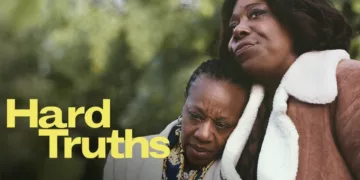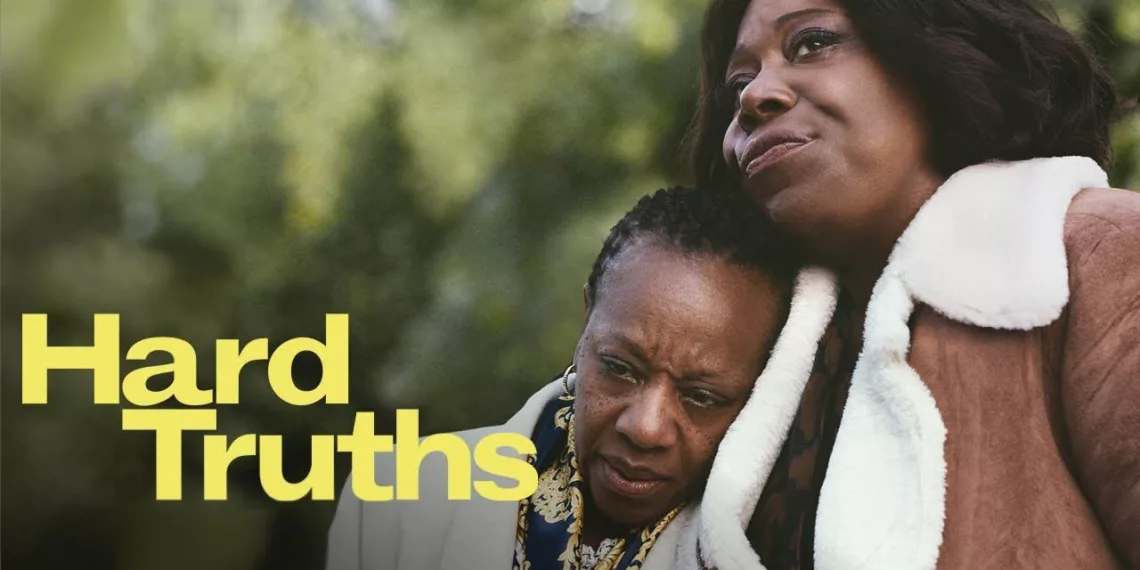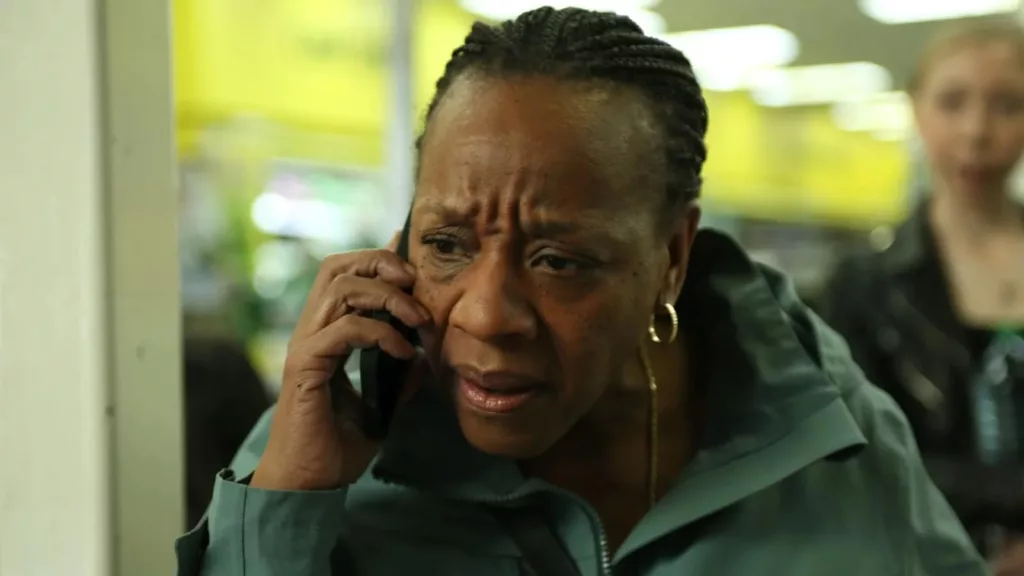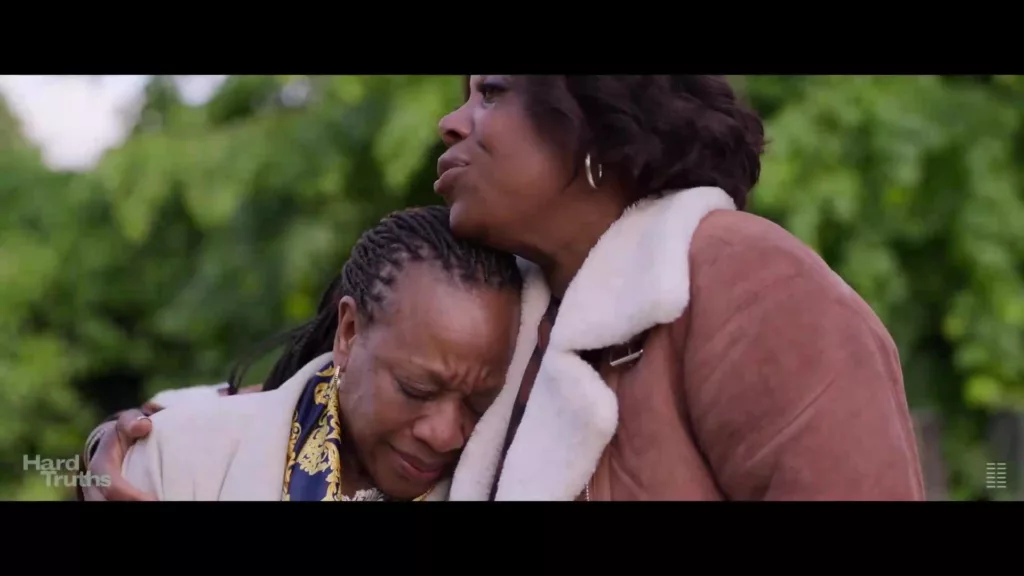In Hard Truths, veteran British filmmaker Mike Leigh plunges us into the complex, messy world of an ordinary London family. Released in 2023, the film tells the story of Pansy Deacon, a woman battling internal demons that constantly explode outwards in rage against everyone around her. Played with raw intensity by Marianne Jean-Baptiste, Pansy provides an unforgettable lead character – and one we come to understand despite her unlikability.
Through Pansy and her relationships with sister Chantelle and others close to her, Leigh contemplates what gives some people happiness while leaving others sunk in sadness. He does this by taking a non-judgmental look at real human flaws and frailties, revealing hard truths in a way that feels deeply compassionate. Thanks to outstanding performances and subtle direction, Hard Truths peels back the layers of its characters to challenge assumptions while keeping us deeply engaged.
While Pansy shrieks insults at all who cross her path, an exploration of her past and family dynamics shows there’s more beneath the surface. The contrasts between her life and Chantelle’s also speak to life’s complexities. How Leigh and his team bring these characters and themes to moving, meaningful life is well worth examining in this discussion of mental health, interpersonal drama, and the elusiveness of joy.
The Torment Within
Right from the start, we understand Pansy is troubled far beyond her furious outward demeanor. The film introduces her waking in a panic, and it’s clear her mental state includes ongoing anxiety as well as depression. Her anger, it becomes evident, stems from internal torments she can’t escape.
Pansy’s unhappiness has taken a drastic toll on those around her. Her constant shouting at husband Curtley and adult son Moses has left the family home an atmosphere of tension and unease. The two men seem to float through their days with a lingering sadness, having endured Pansy’s verbal onslaughts for who knows how long. Their reluctance to engage or stand up for themselves speaks volumes about the damage done.
Yet somehow even in the midst of rage, Jean-Baptiste reveals chinks of vulnerability in Pansy that keep us watching intently. Moments when hurt or fear flashes across her face make clear her behavior originates from profound pain, not mere meanness. Through subtle expressions, gestures and body language, the actress conveys an inner depth and complexity that makes Pansy impossible to simply write off.
Pansy’s cleaning rituals and tendency to sleep the day away provide insights into compulsions born from mental anguish. She’s bogged down by visible signs of stress like headaches and digestive issues. All indicate how her distressed mind translates into diverse physical manifestations. Her deteriorating home life and relationships seem direct consequences of a psyche in discord.
The film emphasizes that cruelty doesn’t emerge from nowhere – it’s often a misguided attempt to externalize internal demons. As Pansy’s backstory slowly emerges, so does a subtle message of compassion even for those who inflict suffering upon others. For behind fierceness may lurk fragility, and nowhere is this more apparent than in Leigh’s rich character study of the woman at the film’s tempestuous center.
A Ray of Light
Such a difference exists between Pansy’s shut-in world and the vibrant environment created by her sister Chantelle. As a hairdresser running her own salon, Chantelle has cultivated a tight-knit community. Scenes where she styles clients’ hair while joking and listening to their lives bring moments of levity.
Most importantly, Chantelle embodies kindness. Despite Pansy’s constant outbursts, Chantelle meets her anger with patience and understanding. “I don’t know you, but I love you,” she reassures. It’s this unconditional care that provides the story’s emotional anchor.
Michele Austin perfectly captures Chantelle’s talent for lifting others. Even in small gestures, she radiates warmth and compassion. Whether helping clients or her own daughters, Chantelle connects people to their fuller selves.
How different from Pansy’s isolation. But through Chantelle we see life can unfold differently, as hers does surrounded by loved ones. Her bright apartment contrasts Pansy’s bare space and echoes with laughter. Touching interactions between Chantelle and her successful grown daughters, played with humor and care by Nelson and Brown, underscore their close bond.
Where Pansy hides in darkness, Chantelle shines light, reminding us even the darkest souls need caring hands to lead them back into the world. Austin makes Chantelle the beacon that helps us understand, and hope for, Pansy’s recovery.
Beneath the Surface
Pansy’s tormented mental state emerges through varied expressions. Her depression leaves her sleeping much of the day, while anxieties spark fits of anger and paranoia over common irritants.
Hard Truths resonates by upholding life’s messiness. It acknowledges sadness’ power to overwhelm without simplistic answers. Pansy’s husband and son also suffer from her emotional abuse, their withdrawn routines revealing prolonged mental hurt.
Yet Leigh avoids reducing these dynamics. Family ties endure through acceptance without needing to condone unhealthy actions. Curtley and Moses’ perseverance, though flawed, attests to this nuanced understanding.
Chantelle too upholds compassion despite discords. Her care stretches beyond surface resentments, finding humanity beneath outward disorder. In challenging us to see beyond behaviors into lived experiences, Hard Truths taps life’s complexity with rare empathy.
By witnessing inner struggles ‘manifestations sans pat resolutions, viewers share pressures families tackle daily. The film values showing mental illness’ diverse impacts, from withdrawnness to volatility, without victimizing or diagnosing. Above all it reflects reality’s shades of gray through fully-realized characters navigating life’s hard truths together.
Delving Deeper Through Craft
On a technical level, Hard Truths sings because of dedicated craftspeople working behind the scenes. Cinematographer Dick Pope knows not to upstage the performances, instead framing shots that feel intimate while letting subtleties surface.
Production designer Suzie Davies fills each space with nuanced details that deepen our insight. From starkly beautiful flowers in a gray kitchen to richly layered homes, every aspect tells its own small story.
Similarly, costume designer Jacqueline Durran dresses characters in a way that speaks through texture and color, even when words aren’t exchanged. Subtexts emerge through such meticulous work.
Composer Gary Yershon, a Leigh collaborator since the beginning, knows just when to underscore dramatic beats and when a melancholy melody can speak what’s unsaid. His score acts as the film’s subconscious.
Together, these talents transform dreary domestic settings into vivid worlds where lives unfold, ensuring intimate moments land with profound resonance. Their gifts of craft elevate material that, in less intuitive hands, could have wallowed in misery. Instead, artistry shines light into the film’s darkest corners, where humanity glimpses hope even in hardest of truths.
Bringing Hard Truths to Life
This film lives or dies on its performances, and what an incredible cast Leigh has assembled. Topping them all is Marianne Jean-Baptiste, who goes further than ever before as Pansy. Funny yet gut-wrenching in equal measure, she owns this role body and soul. Whether shouting insults or conveying immense inner turmoil with the smallest gesture, Jean-Baptiste sinks her teeth in – this could well win awards recognition.
You can see why actors keep returning to Leigh. His preparation method unlocks untold layers, and under his direction players seem liberated. Michele Austin also charms as the compassionate Chantelle, the emotional anchor. Even smaller roles feel vibrant, though Curtley deserved more depth.
This film is a testament to these talents that flawed characters remain compelling. They breathe heart into Leigh’s precise vision, balancing bleakness with bits of humor. The director knows true drama isn’t found in artificial plot devices, but within how real people navigate hard realities.
His casts always understand this, and with performances this nuanced, they lift messy realities into art that educates even as it entertains. Audiences are left thinking not just about these families, but their own unpredictable journeys through life’s hard truths.
Life’s Hidden Depths
While not an easy watch, Hard Truths rewards those who peer beneath its surface. Leigh’s unflinching character study unpacks life’s painful complexities and realities in a way few achieve.
Pansy serves as the raging heart of a film exploring happiness’ elusiveness along with mental health challenges and family dynamics. Jean-Baptiste gives a remarkable performance deserving the highest praise, as do co-stars like Michele Austin who bring characters to life.
Through his company’s journeys and traumas, small joys and quiet triumphs, we glimpse emotion’s many shades. Leigh challenges viewers while giving space for private understanding to emerge. His work proves character is destiny, and fuller histories shape outward actions in complex, human ways.
For all its difficulties, Hard Truths ultimately affirms life’s interconnectedness and how even society’s most damaged may yet offer community gifts through their mere presence. Leigh’s astounding ability to extract meaning from the mundane makes this, as all his works, required viewing for true cinema lovers.
The Review
Hard Truths
Hard Truths presents an intimate yet universally resonant portrait of a family grappling with mental health, embracing the messy realities of human experience with empathy and artistic depth. Led by a powerfully raw central performance, Mike Leigh's latest proves once more a master of his craft, subtly challenging perspectives while bringing complex characters to life. For those willing to journey beyond surface anger into life's deeper truths, Hard Truths offers a rewarding 8/10.
PROS
- Raw, emotionally complex performances particular by Jean-Baptiste
- Subtle exploration of themes like depression, family, and finding happiness
- Observant direction and production values that enhance character-driven story
CONS
- Dark subject matter may deter some audiences
- Secondary characters feel somewhat thinner in development
- Lack of catharsis for victims of Pansy's behavior


















































